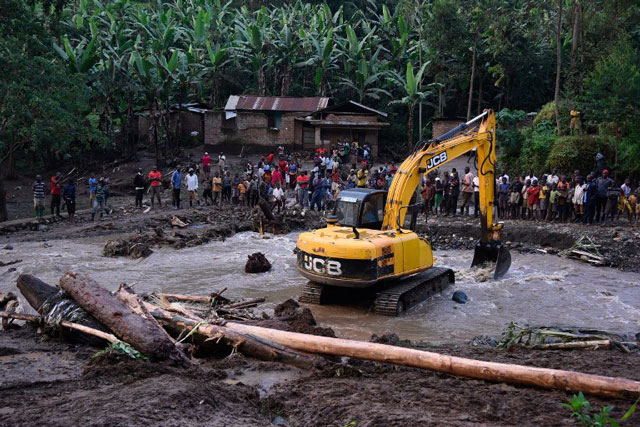
Landslides claim lives in hundreds yearly and leave many homeless and destitute. The Rwenzori
and Elgon region over a period of 10 years has experienced radicle landslides. Unfortunately,
many continue to grapple with the effects of these disasters continually.
In the wake of the Indian Ocean Dipole, a weather phenomenon which causes a rise in water
temperatures in the Indian Ocean up to 2C and as a result leads to higher evaporation rate off
the East African coastline —this has been regarded by scientists as the explanation for the
recent continuous rains in East Africa.
In October 2019, the government of Uganda in partnership with the University of Maryland ran
a project of installing rain gauges that would provide early warning signs on the rain levels.
This was aimed at providing early evacuation warnings to residents in the land slide prone
areas. While the equipment did provide the information on the increasing rain levels and
information was shared with the residents of Bududa, few adhered to the warnings.
It should be noted that government started the Kiryandongo resettlement project after the
2010 landslide disaster. The cabinet approved the project and the committee that was selected
in that regard established that 100,000 people were at high risk of experiencing landslides and
required resettlement in safer locations. Government agreed to acquire 3200 acres of land
each year and provide 2.5 acres of land to each family at risk.
In a period of 10 years a total of 32,000 acres of land would have been acquired, enough to
resettle many displaced Ugandans in the Rwenzori and Elgon region.
We cannot continue to pile the statistics of the dead as a result of the landslides, responsible
ministries have a mandate to the people in these regions to protect and provide for them as
citizens of Uganda.
It should be noted that from 2010 we have had seven major landslide incidents and very few
people have been resettled in each incident.
In March 2010, the areas of Names, Pukalani Subcounty experienced landslide and 100 people
were confirmed dead and 5000 people displaced. In June 2012, Namaga, Bunakasala in Bududa
experienced another landslide and 450 people were confirmed dead with property and
livestock lost as well. In August 2017, the region of Bufupa Parish in Sironko district
experienced landslide with 7 people reported dead and hundreds displaced. In October 2018,
Suume village in Bukalasi-Bududa experienced landslide with 42 people reported dead and 500
people displaced. In May-October 2018 the areas of Namisindwa, Manafwa, Sironko, Bududa
and Bulambuli experienced 67 registered landslides, while no deaths were registered thousands
were left homeless. In June 2019 the areas of Buwali Sub county in Bududa had an episode of
landslides and 5 people were reported dead and 400 people were displaced.
The ongoing land slides in the Rwenzori and Elgon region are a clear indicator of how
implementation of policies is still evasive to us as a people. There is a looming gap that needs
to be addressed in providing resettlement, emergency rescue plan and rapid response units for
the people of Bududa. With no alternatives, they will stay in Bududa regardless of the life
threat the region poses.
There needs to be a deliberate resettlement plan for these people and a conservation remedy
for the Elgon and Rwenzori Mountain slopes in order to avert the continuous outbursts of
landslides that are as a result of erosions and tree cutting in the mountain regions.
The low lands continue to pose a life threat to the people of Bududa who by far have only had
spades and hoes as rescue tools. Government should revisit the relevance of the rain gauges
installed in the region and provide early warning alternatives to the residents in the Rwenzori
and Elgon region.
As the rains wage on, we stand in solidarity with the people in the Rwenzori and Elgon region.
We continue to advocate for the ubuntu ideology in these communities, so that as many as can
help will be placed in that position to do so.
Tricia Gloria Nabaye
gnabaye@gliss.org


